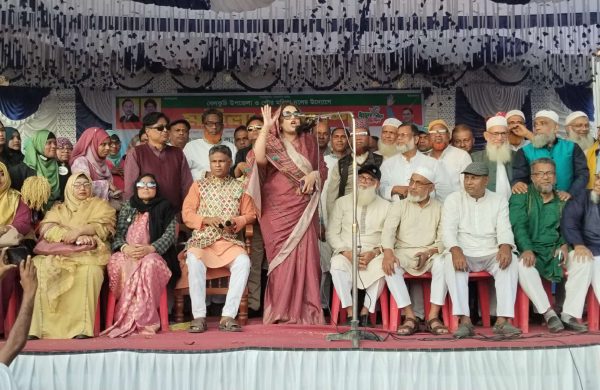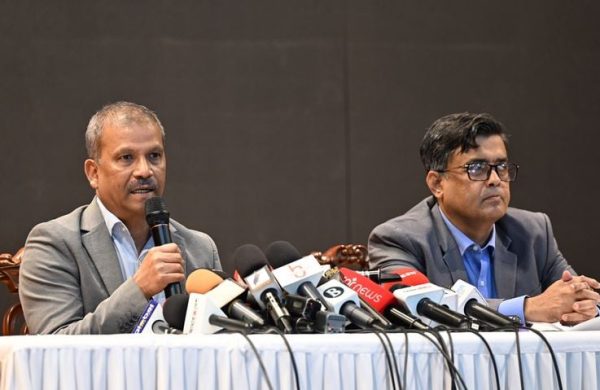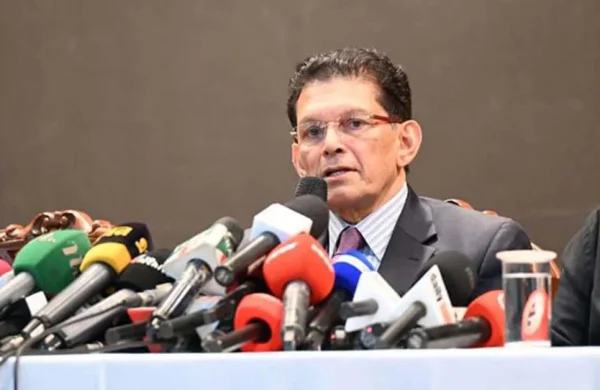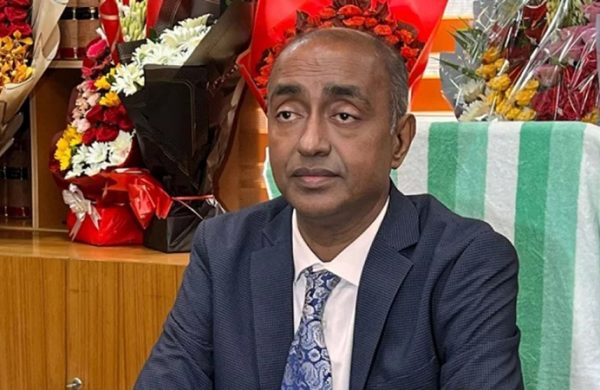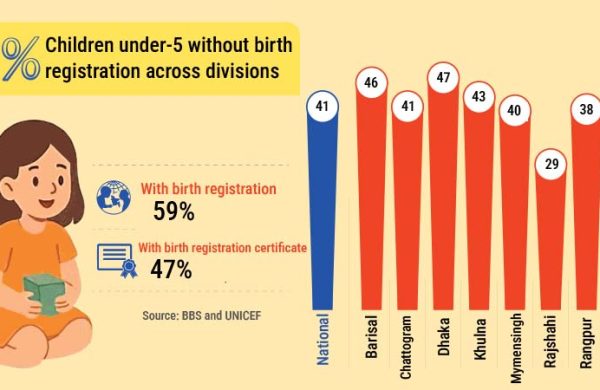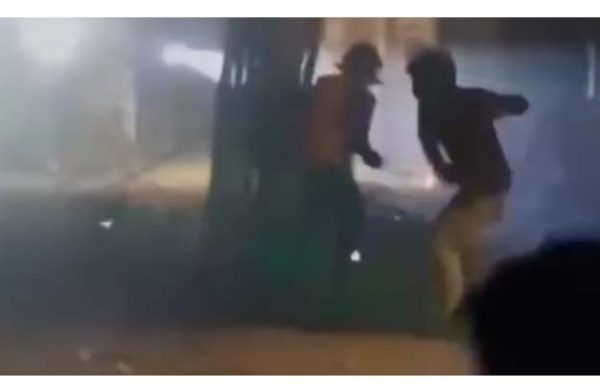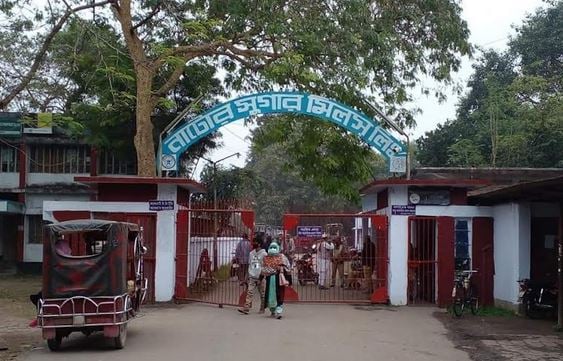Does the referendum render illiterate voters invisible?
- Update Time : Thursday, November 20, 2025
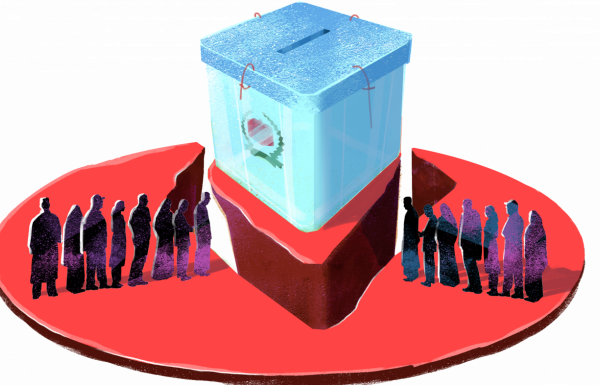
TDS Desk:
Monirul Islam, a rickshaw puller in Dhaka originally from Ghoraghat Upazila, Dinajpur, is aware that a referendum will take place. When asked to read the question aloud, he replied, “I studied a few classes at school. But I cannot read or write. I have heard that there will be a referendum. I still don’t understand what is written on it.”
In other words, although he attended school for a few years, he cannot read or write and is unable to comprehend the referendum question even after hearing it.
Abu Malek, a fish trader born in Old Dhaka, said, “I also heard that a referendum will be held. But it seems so complicated. How will I cast my vote?”
The upcoming referendum, related to the July Charter, includes a question that a large segment of the population, like Monirul and Malek, will neither be able to read nor understand.
Official statistics indicate that 22 percent of the country’s population is illiterate, meaning they cannot read. However, education experts argue that even among the remaining 78 percent who can read, comprehension is not guaranteed. Although exact figures are unavailable, they believe the number of people struggling to understand the question is not lower than the number of illiterate citizens.
Consequently, the question and the four issues in the referendum are likely beyond the comprehension of roughly half the country’s population.
According to the Election Commission, the number of registered voters in Bangladesh now exceeds 130 million. Education specialists estimate that the referendum question is incomprehensible to five to six crore voters, or even more.
Mujibur Rahman, professor at the Institute of Education and Research, Dhaka University, told journalists, “Referendums are not new in our country; they have been held before when the number of literate citizens was even smaller. But the question posed this time is inherently complex. Even with extensive campaigning, its full understanding is difficult, because a large proportion of the population still cannot read or write. Naturally, the real question is how much of the question they will actually grasp.”
He added, “The referendum question must be simplified so that anyone—literate or illiterate—can understand, merely by listening, what the state is asking their opinion on. People should be able to clearly understand whether they are saying ‘yes’ or ‘no’ on the matter.”
WHAT IS THE REFERENDUM QUESTION?
Voters will cast a single ‘Yes’ or ‘No’ on the July Charter approval, but the question incorporates four key points.
The question reads: “Do you agree with the July National Charter (Constitutional Reform) Implementation Order, 2025, and the following proposals?”
- a) During the election period, the caretaker government, the Election Commission, and other constitutional institutions will be formed in accordance with the framework of the July Charter.
- b) The Parliament will be bicameral. An upper chamber of 100 members will be created, and its approval will be mandatory for constitutional amendments. Parties will gain representation in the upper chamber based on national vote share.
- c) Winning parties must implement the 30 consensus points of the July Charter. These include measures such as increased female representation, an opposition-elected Deputy Speaker, term limits for the Prime Minister, expanded powers for the President, extension of fundamental rights, and strengthening the independence of the judiciary and local government.
- d) Other reform commitments promised by political parties will also be implemented.
THEY CANNOT EVEN READ
According to the latest Bangladesh Economic Survey 2024 published by the Bangladesh Bureau of Statistics (BBS), the literacy rate among the population aged seven and above currently stands at 77.9 percent, meaning nearly 22.1 percent of people remain illiterate.
The definition of literacy has varied over time and across different national benchmarks. The 1961 census considered a person literate if they could understand and read any language. The 1982 census defined a literate person as someone capable of writing in any language. UNESCO defines literacy as the ability to read and comprehend basic information in daily life and to write accordingly.
K M Enamul Haque, former Deputy Director of the National Literacy Campaign, believes the BBS research does not reflect the true picture. He explains, “Literacy is measured in two ways: self-reported, where the individual is asked whether they are literate, and test-based, which requires passing a specific examination.
“The BBS study did not conduct any tests; it relied entirely on self-reporting. Enumerators asked people door-to-door, ‘Are you literate or illiterate?’ Respondents answered according to their perception. Many who can actually read and write identified themselves as ‘illiterate,’ while some who can read only a little considered themselves ‘literate.’ Consequently, the research does not capture actual proficiency accurately.”
Regarding the referendum question, he warns that it carries the risk of bias and confusion. “When a question requires a simple ‘Yes’ or ‘No,’ the number of variables involved should correspond to separate questions. Here, multiple issues are condensed into a single ‘Yes’ or ‘No.’ This presents a challenge not only for the illiterate but also for those with limited comprehension or intermediate literacy. In such cases, someone must read the question aloud, which may introduce bias and compromise confidentiality.”
LANGUAGE ITSELF IS ‘COMPLEX’
Professor Tariq Manzur, a linguist at the University of Dhaka, believes the language of the referendum question will create linguistic complexity for illiterate and semi-literate voters. He notes that the questions contain recommendations on issues that most people in the country are largely unfamiliar with.
The linguist acknowledges, however, that the language of constitutional questions does not necessarily have to be simplified; rather, political parties should work to explain these issues in simpler terms. Procedurally, he feels there is a problem with how the questions have been structured.
The Bangla Department professor says, “A single ‘Yes’ or ‘No’ vote has been proposed for four questions, which is inappropriate.” He suggests that each question could have had four separate boxes, allowing voters to mark ‘Yes’ or ‘No’ individually.
Senior lawyer Monzil Morshed told Journalists that, “It is like asking whether you want to eat rice, lentils, and biryani together; if you want all three, you answer ‘Yes.’ But if you do not want biryani with the rice, you would naturally say ‘No.’ Assuming that voters will automatically say ‘Yes’ is unrealistic. Each referendum question has an opposing side, so ‘No’ is a perfectly natural response.”
He adds, “By combining four different issues into a single referendum question, it becomes an even greater barrier for illiterate populations. The complexity is such that they will not be able to fully comprehend the issues, effectively limiting their ability to express a genuine opinion despite having the right to participate.”
Professor S M Ali Reza of Dhaka University’s Department of Political Science notes, “In previous referendums in our country, there was a single, well-defined issue, and campaigns focused on that topic. As a result, voters could understand it. But this time, the issue is complex. I am somewhat doubtful whether the outcome of this referendum will truly reflect the aspirations of the general population in Bangladesh.”
Munira Khan, election observer and President of the Fair Election Monitoring Alliance (FEMA), says, “The first question that should have been asked of leaders of major parties is: how will those who cannot read participate in this referendum? Yet no one has raised this issue.
“In general elections, voters at least had the advantage of voting by symbol. But in this referendum, that facility is absent. The gap between the language of the questions and their practical application is so wide that it cannot be ignored—this is a highly significant policy concern.”
COULD VOTERS’ CHOICES BE MANIPULATED?
Professor Farid Uddin Ahmed of Dhaka University’s Department of Political Science fears that the principle of secret ballots could be at risk, as illiterate voters may not fully understand their ballots.
He told journalists, “Even if the number of illiterate people is relatively low, the population that can read but cannot comprehend the content is far larger in reality. If someone explains to them where to mark the ballot, the secrecy of the vote is effectively lost.”
Shahin Anam, Executive Director of a national foundation, adds, “If illiterate voters are not properly guided, they will be unable to make independent decisions. This means they will be instructed to mark ‘Yes’ or ‘No’ rather than decide on their own. Consequently, local power brokers are likely to play a significant role.”
WHAT THE GOVERNMENT SHOULD DO
Kazi Mahfuzul Haque Supon, Associate Professor at Dhaka University’s Law Department, has urged extensive campaigns to raise awareness about the referendum question.
He told Journalists, “For those who cannot read, the government should explain the issues simply on television and run continuous broadcasts so that they at least understand the steps of the question, which topic falls under which number, and how to answer.”
He emphasised, “It is the state’s responsibility to ensure that all citizens can participate in the referendum.”
WHAT POLITICAL PARTIES ARE SAYING?
Political parties have also expressed dissatisfaction with the structure of the question.
Mujibur Rahman, Deputy Amir of Jamaat-e-Islami, said, “Initially, we proposed only a simple ‘Yes’ or ‘No’. But the Chief Adviser added three to four conditions, which must now be accepted together with either a ‘Yes’ or a ‘No’. Since he introduced the referendum question, he will also determine how illiterate voters will cast their votes.”
He remains hopeful that widespread campaigning will allow illiterate people to understand the issues by listening to others.
Ariful Islam Adib, Senior Joint Convenor of the National Citizens Party (NCP), said, “For a large section of the country, this will be very complex. The question should have been clarified and simplified so that both illiterate and literate citizens could understand it.”
He added, “The original two-line question or proposal presented by the Consensus Commission was somewhat simpler. But later, without consulting other political parties, the government prepared this complex question paper largely based on BNP’s suggestions. The government should have sought input from all parties, which might have made it easier to understand.”


